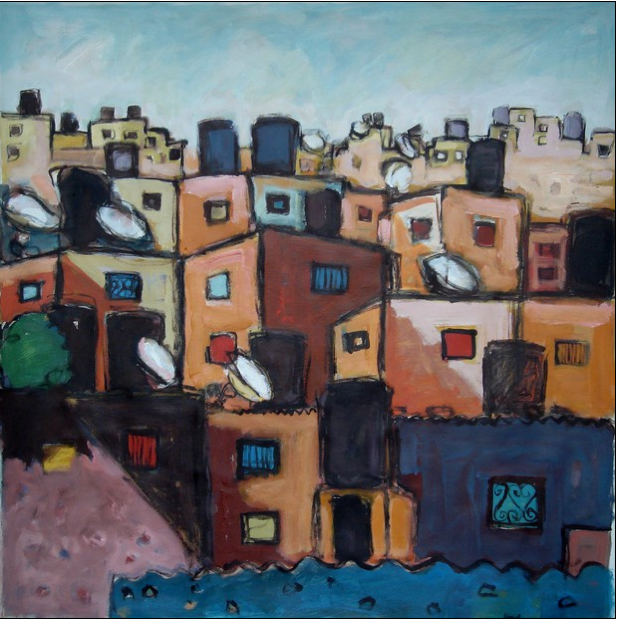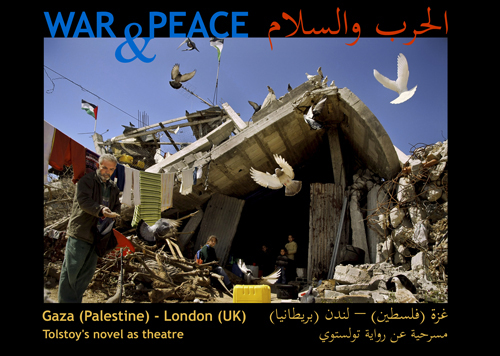Yesterday evening I spoke to Hossam and Jamal, directors of Theatre for Everybody in Gaza. We are all looking forward to Sunday 18th January in three days time when we will be having a public skype conversation at the event at Rich Mix that starts at 3pm with a reading of extracts from a stage adaptation of Resurrection by Leo Tolstoy. Get tickets
This is a benefit for War and Peace: Gaza (Palestine) – London (UK), a part of our ten-year partnership of cultural and creative exchange.
I have been exploring all ways and means to get support, help and advice in trying to get the required permission to enter Gaza through the Eres Crossing in February. I am hoping to spend 9 days there after being in Ramallah, Palestine, working with Caryl Churchill and Ashtar Theatre on Love and Information.
It was possible to get into Gaza through Egypt and the Rafah crossing until the army ousted Muslim Brotherhood President, Morsi, in July 2013.
Now it’s only possible to get there through Israel but unless you have special contacts and liaison with the Israelis this is very difficult. I had a Gaza entry application form from the Israelis from a former attempt and it had a telephone number on it. I rung it and talked to somebody from the Israeli Co-ordination and Liaison Administration to the Gaza Strip. He wondered how I’d got the number and told me kindly that Eres wasn’t a check-point it was a crossing. I thought that was nice. He said only organisations registered with the Israeli Ministry of Interior were given permits and told me to go through their web-site. I’ve requested an application form but they haven’t yet accepted my log-in name and password. The British Council have referred me to the Foreign and Commonwealth Office guidelines. They will provide ‘comfort’ letters to facilitate travel to the West Bank but Gaza is another country. Their official and personal advice is: don’t go.
My friend Steve Tiller was invited by Theatre Day, a children’s theatre company started by Dutch theatre practitioners decades ago. He got into Gaza because this company has a liaison with the Israelis and maybe are registered with the Ministry of Interior. I asked them for help but they told me that they couldn’t because I wouldn’t be under their protection in Gaza. Read about Steve’s trip last year.
I was feeling completely despondent. Nobody was offering me any help or support. I decided it was really impossible. And then yesterday, in response to a request that I had made to the PLO Mission here in London, the Cultural Attache called me and started to describe what they could do to get me to meet the right people in Ramallah to secure the liaison with the Israelis. I was overjoyed. It is by no means certain that I can get in but at least there is a chance.
Going to Gaza is important to sustain our project. Talking to Hossam and Jamal I expressed the feeling that maybe we had taken on too much in seeking to base a piece of work on Tolstoy’s War and Peace. Hossam has produced an Arabic translation of the version created by Erwin Piscator fro a production at the Schiller Theatre in Berlin in the mid-1950s. If you are interested in this translation please contact Az Theatre.
The workshops Theatre for Everybody had planned were made impossible by the war last year. They were to collaborate with the French Institute but the people who worked there have left. People are exhausted. The cultural, social and human infrastructure is in ruins.
So I asked them if it was not better to change the aim of the project and to undertake work with young people using perhaps the themes from the book.
Both Jamal and Hossam told me they would be disappointed not to pursue our aim, that there were already projects in Gaza working with young people and that they saw this War and Peace project as a unique inspiration to produce theatre.
We started talking about the basic themes and the structure of the story and how it was about a friendship between two men, Pierre and Andrei, who were quite different. One was inclined towards peace and the other was inclined towards war. We talked about how friendships were often between people who were radically different. So why did these two men react so differently to their situation and what were the forces at work on them that drew them together?
Suddenly the story began to light up with significance.
They told me that they would be starting their work very soon and that they would build the company almost one person at a time. We agreed it was very important in the circumstances to use the work to build up creative relationships and that the aim should be to make contact with the key movements in the story rather than obeying strictly the requirements of the text.
Our project is characterised by this feeling of being on a rollercoaster. At one moment everything seems impossible and at the next, because of the human contact and shared basic aims, everything seems possible again.
Who knows? In mid-February I may be joining them in Gaza and we will be working together to develop our production of War and Peace!


